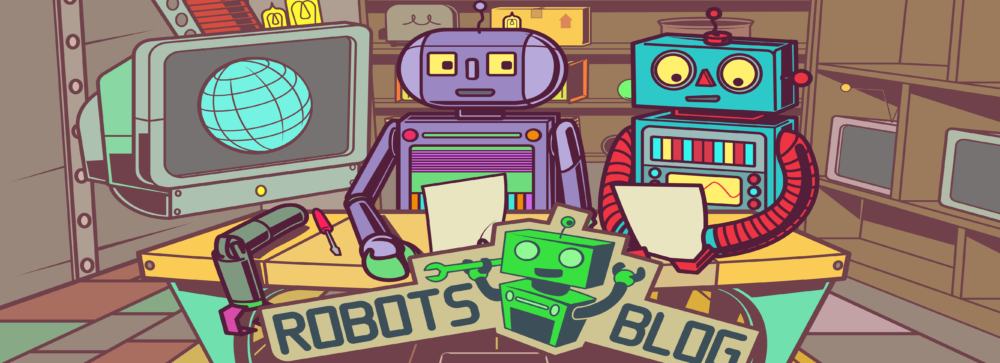Im Robots-Blog Interview gibt fischertechnik Geschäftsführer Martin Rogler einen kompakten Einblick in die aktuellen Robotik-Neuheiten und zeigt, welche Funktionen, Ideen und Einsatzmöglichkeiten hinter den neuen Modellen stecken. Dabei geht es um praxisnahe Anwendungen, spannende Lern- und Tüftel-Potenziale sowie darum, wie fischertechnik Robotik für Schule, Hobby und Technikfans weiterdenkt. Das Interview liefert einen schnellen Überblick über die Highlights und macht neugierig auf die neuesten Entwicklungen rund um fischertechnik und Robotik.
Archiv der Kategorie: Robots-Blog Content
Kosmos Bionic Robotic Arm im Test – Bionischer Roboterarm als Experimentier-Set
Der Kosmos Bionic Robotic Arm ist ein Experimentierbaukasten, der Elemente aus Bionik und Modellbau kombiniert. Das Set richtet sich an junge technikinteressierte Menschen ab etwa zehn Jahren und verbindet Lernerfahrung mit Bastelspaß.
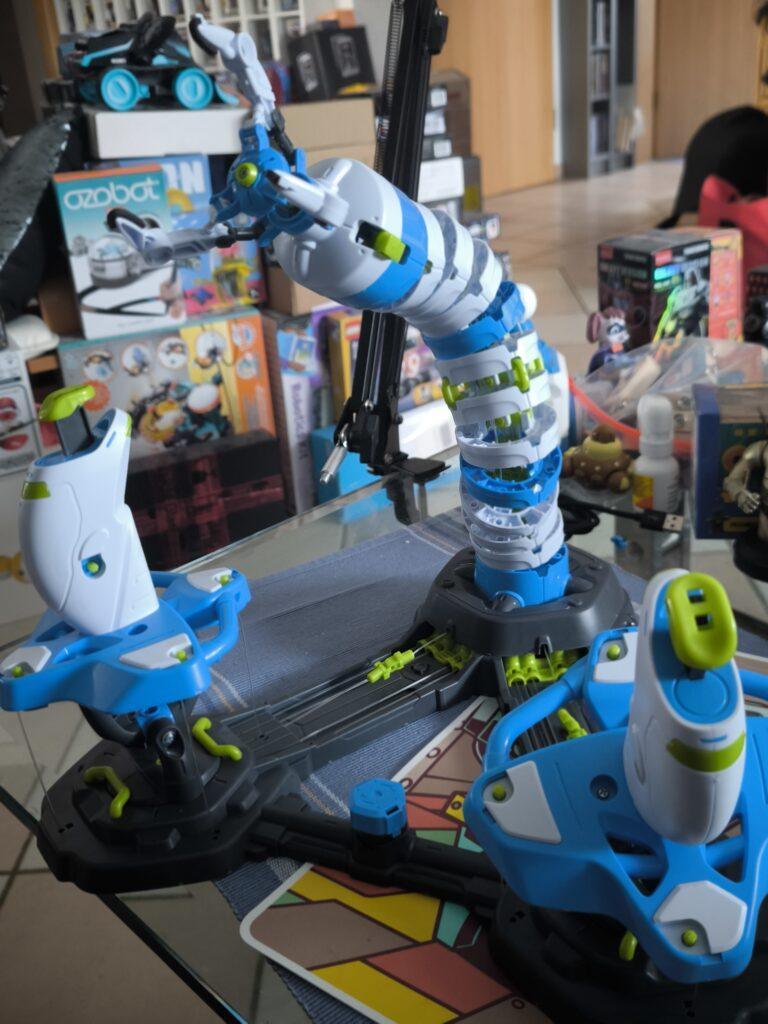
Konzept und Funktionsweise
Im Mittelpunkt steht ein mechanischer Roboterarm, dessen Bewegungsprinzip am echten Elefantenrüssel orientiert ist. Statt Elektromotoren kommt ein ausgeklügeltes System aus Nylonfäden zum Einsatz. Diese wirken im Modell wie künstliche Muskeln und Sehnen. So gelingt es, den Arm in viele Richtungen zu bewegen; die Bewegungen erscheinen sehr flexibel und erinnern an Science-Fiction-Konstruktionen.
Gesteuert wird der Arm über zwei Joysticks. Der eine ist für den oberen, der andere für den unteren Bereich des Arms gedacht. Zusätzlich gibt es Tasten für die Rotation der Greifklaue und das Öffnen und Schließen derselben. Die Steuerung ist komplett mechanisch und benötigt weder Elektronik noch Batterien. Die Kraft wird allein per Hand auf die Bewegungselemente übertragen.
Aufbau und Schwierigkeitsgrad
Mit Bauteilen auf über 8 Teileträgern ist der Bausatz eine echte Herausforderung. Der Aufbau läuft in mehreren Phasen: Zuerst werden Kabelschnallen vorbereitet, dann die Joysticks zusammengesteckt, später der Arm zusammengesetzt und die Fäden eingefädelt sowie gespannt. Genau dieses Einstellen der Nylonfäden ist ein kritischer Punkt, weil dadurch die reibungslose Funktion sichergestellt wird.
Die Anleitung ist umfangreich und bebildert, sodass Schritt für Schritt der Bau nachvollzogen werden kann. Wer Schwierigkeiten beim Nachbauen hat, findet im Internet ergänzende Video-Anleitungen, die besonders bei komplizierten Schritten hilfreich sind. Für den gesamten Aufbau sollte man mehrere Stunden, teils auch mehrere Tage einplanen.
Vorteile des Sets
- Der Kosmos Bionic Robotic Arm vermittelt wichtige Grundlagen in den Bereichen Bionik, Robotik und Mechanik. Während des Aufbaus lernt man, wie komplexe Bewegungssysteme funktionieren und entwickelt technisches Verständnis und Geschick.
- Der seilzugbasierte Antrieb des Arms ist ziemlich einzigartig. Anders als motorisierte Modelle wirkt die Bewegung hier fast organisch.
- Da das System ohne Elektronik und Batterien auskommt, verursacht es keine laufenden Kosten und ist weniger anfällig für technische Ausfälle.
- Der Arm bietet dank verschiedener Aufsätze und hoher Beweglichkeit viel Vielfalt beim Spielen oder Experimentieren.
Nachteile und Herausforderungen
- Mit beinahe 300 Teilen könnte das Set für Jüngere oder Ungeduldige schnell zu viel werden. Geduldige Bastler profitieren, aber wer rasche Erfolge sucht, könnte frustriert sein.
- Für den Aufbau werden zusätzliche Werkzeuge benötigt, etwa Kreuzschlitz-Schraubendreher, Seitenschneider oder eine Feile, die nicht im Lieferumfang enthalten sind.
- Wer beim Einstellen der Nylonfäden nicht genau aufpasst, dem könnte der Arm entweder zu wenig oder zu stark spannen. Das beeinflusst die Funktion und kann mehrere Justierversuche erfordern.
- Im Unterschied zu elektronischen Roboterarmen kann der mechanische Arm nur leichtere Objekte greifen. Zu schwere Gegenstände können das System beschädigen oder verstellen.
- Mit der Zeit könnten sich Fäden lockern, dehnen oder reißen. Dann ist Nachjustieren oder Austauschen notwendig.
Verarbeitung
Die Kunststoffteile des Sets sind passgenau gearbeitet und machen einen stabilen Eindruck. Die Gelenke und Zahnräder lassen sich leichtgängig bewegen. Langfristig könnte der Kunststoff aber bei intensiver Nutzung abnutzen oder ein Nylonfaden reißen. Bei der Vorstellung auf der Spielwarenmessen passierte leider genau das. Ich vermute aber, dass es dafür viele Stunden intensiver Belastung benötigt.
Preis-Leistungs-Verhältnis
Das Set wird im mittleren Preisbereich für Experimentierbaukästen angeboten. Interessanterweise wird es auch unter anderen Marken günstiger verkauft, da Kosmos eine Lizenzversion vertreibt, was manche Käufer zum Preisvergleich anregt.
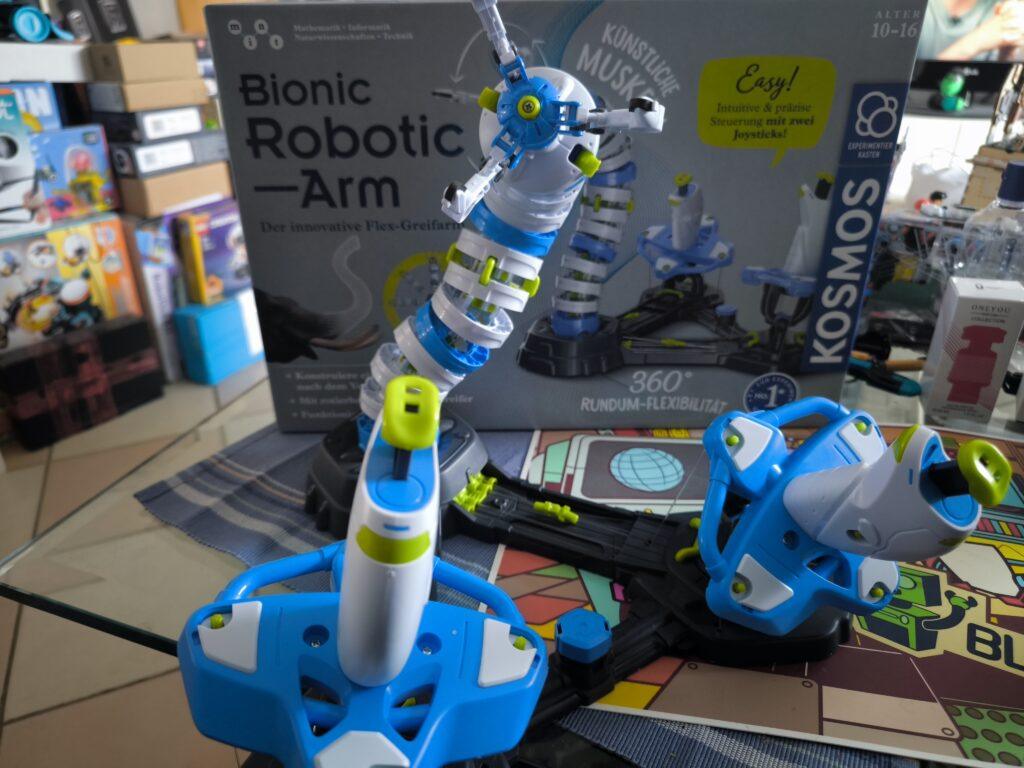
Zielgruppe
Empfohlen wird das Set für Kinder ab etwa zehn Jahren, wobei jüngere Baufans durchaus Unterstützung gebrauchen können. Auch für Modellbau-Fans und Sammler ist das System durch seine mechanische Funktionsweise interessant.
Fazit
Der Kosmos Bionic Robotic Arm ist ein Experimentierbaukasten mit spannendem mechanischem Konzept. Sein bionisch inspiriertes Zugseilsystem hebt sich deutlich von anderen Roboterarmen ab und bietet wertvolle technische Einblicke.
Besonders zeichnet sich der Bausatz durch seinen Lerneffekt, die robuste Bauweise und die geschmeidigen Bewegungen des fertigen Arms aus. Die hohen Anforderungen an Präzision und Geduld beim Aufbau sind für viele Nutzer eine echte Herausfoderung, können aber gerade bei Kindern zu Frust führen.
Insgesamt handelt es sich um ein solides Lernspielzeug für Bastlerinnen und Bastler, das mit Herausforderungen, aber auch mit einem faszinierenden Arbeitsprinzip belohnt. Wer Freude an Technik, Robotern, Bionik und Mechanik hat, wird viel Spaß am Kosmos Bionic Robotic Arm haben.
M5Stack StackChan Review Video by Robots-Blog
M5Stack Stackchan is now available at @Kickstarter
See my short review Video by @RobotsBlog and get your own Stackchan now!
#robot #ai #stackchan #opensource #desktop #desktoprobot #diy #companion
StackChan by M5Stack Now Available on Kickstarter
January, 2026 — M5Stack, a global leader in modular IoT and embedded development platforms, today launched StackChan, the first community-co-created open-source AI desktop robot, built on a proven ESP32 platform and designed to be endlessly hackable by makers worldwide.
Unlike closed, concept-driven AI robots, StackChan exposes its hardware, firmware, and interaction logic from day one — turning a playful desktop companion into a real development platform.
StackChan is now live on Kickstarter with a $65 Super Early Bird offer available for the first 72 hours.

From Community to the Globe: How StackChan Was Born
Before its official launch by M5Stack, StackChan had already existed as a community-driven project since 2021. Built on M5Stack standard controller, Core series, it began as a personal open-source project by maker Shinya Ishikawa, sustained and shaped through ongoing community contributions.
As more enthusiasts joined the project, contributors like Takao, who helped popularize the DIY kits, and Robo8080, who introduced AI capabilities, played key roles in expanding StackChan beyond its original form.
Inspired by StackChan’s expandability and creative potential, M5Stack officially brought the project to life as its first ready-to-play yet endlessly hackable desktop robot—while keeping its community-driven spirit at the core.
What Remains: Core Computing & Interaction Capabilities
As with the original version, StackChan continues to use the M5Stack flagship Core Series (CoreS3) as its main controller. CoreS3 is powered by an ESP32-S3 SoC with a 240 MHz dual-core processor, 16 MB Flash, and 8 MB PSRAM, and supports both Wi-Fi and BLE connectivity.
To enable richer interactions, the main unit integrates a 2.0-inch capacitive touch display, a 0.3 MP camera, a proximity sensor, a 9-axis IMU (accelerometer + gyroscope + magnetometer). It also includes a microSD card slot, a 1W speaker, dual microphones, and power/reset buttons. Together, these hardware components form a solid foundation for StackChan’s audio-visual interactive experiences.
For more technical details, please refer to the StackChan documentation: https://docs.m5stack.com/en/StackChan
What’s New: Ready-to-Play Functions Powered by Advanced Hardware
For the robot body, several advancements have been made to make it easier to get hands-on and improve the out-of-box experience. It features:
Power & connectivity: A USB-C interface for both power and data, paired with a built-in 700 mAh battery.
Movement system: 2 feedback servos supporting 360° continuous rotation on the horizontal axis and 90° vertical tilt—enabling expressive movements with real-time position feedback.
Visual feedback: 2 rows totaling 12 RGB LEDs for expressive system and interaction feedback.
Sensors & interaction: Infrared transmission and reception, a three-zone touch panel, and a full-featured NFC module enabling touch- and identity-based interactions.
On the software side, StackChan is ready-to-play for starters with no coding required. The pre-installed factory firmware delivers:
Expressive faces and motions: Preloaded with vivid facial expressions and coordinated movements that bring personality and liveliness to StackChan.
Built-in AI agent: Integrates an AI agent for natural voice-based interaction and conversational experiences.

App-based remote interaction: Supports official iOS app for video calls, remote avatar control, and real-time interaction with StackChan.

Chan-to-Chan Friends Map: Enables discovery of nearby StackChan devices, unlocking playful multi-device and social interaction scenarios.

Open for customization: While beginner-friendly by default, the firmware supports further development via Arduino and UiFlow2, making it easy to create custom applications.

100% Open-Source: Built to Be Customized and Extended
In an era filled with closed, concept-driven “AI robot” products, StackChan stands out with its open-source core. From firmware and hardware interfaces to development tools, every layer is designed to be explored, modified, and extended by users.
Beyond code, StackChan also encourages physical customization. With 3D printing and creative accessories, users can personalize their StackChan’s appearance and turn it into a unique desktop companion.
Open-source repository: https://github.com/m5stack/StackChan
Fun with Global Community: Share, Extend, and Evolve Together
Since its birth, StackChan has grown into a vibrant global community of makers, developers, and enthusiasts. From sharing projects and source code online to hosting meetups and anniversary events offline, the community continues to expand what StackChan can be.
Owning a StackChan is not just about building a robot—it’s about being part of an open ecosystem where ideas and creativity evolve together.
StackChan is not built to its end at launch. It is built to grow—through open technology, creative experimentation, and a global community that continues to redefine what a desktop robot can be.
Discover your StackChan on Kickstarter now: https://www.kickstarter.com/projects/m5stack/stackchan-the-first-co-created-open-source-ai-desktop-robot?ref=d5iznw&utm_source=PR
Der kleinste programmierbare Roboter der Welt!
Stell dir vor, ein Roboter ist so klein, dass er fast auf die Spitze eines Bleistifts passt – und trotzdem ganz allein denken und handeln kann. Klingt wie Science-Fiction? Forschende haben genau das geschafft! In einem aktuellen Bericht von heise online geht es um den kleinsten programmierbaren autonomen Roboter der Welt. Lass uns gemeinsam entdecken, was dieses Mini-Wunder kann – und warum es so spannend für die Zukunft ist.
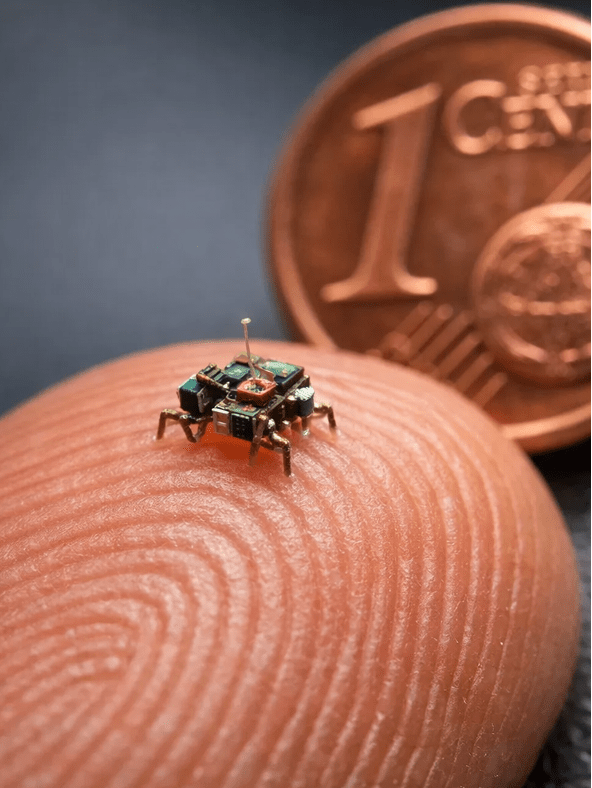
Was bedeutet „programmierbar“ und „autonom“?
Bevor wir zum Roboter selbst kommen, klären wir kurz zwei wichtige Begriffe:
- Programmierbar heißt: Menschen können dem Roboter sagen, was er tun soll – zum Beispiel laufen, stoppen oder einem Licht folgen.
- Autonom bedeutet: Der Roboter entscheidet selbst, wann er was tut. Er braucht keine Fernsteuerung.
Und jetzt kommt das Erstaunliche: Dieser Roboter kann beides – obwohl er nur wenige Millimeter groß ist!
Der neue Roboter ist kaum größer als ein Staubkorn im Vergleich zu normalen Maschinen. Er ist so winzig, dass man ihn nur mit sehr ruhiger Hand oder unter dem Mikroskop genau anschauen kann. Trotzdem stecken in ihm eine winzige Elektronik. Sensoren, mit denen er seine Umgebung wahrnimmt und ein Antrieb, der ihn bewegen kann.
Das Team hinter dem Projekt arbeitet an der Northwestern University in den USA. Dort wird schon lange an extrem kleinen Robotern geforscht.
Was kann der Mini-Roboter?
Obwohl er so klein ist, kann der Roboter:
- sich selbstständig bewegen
- programmierten Befehlen folgen
- auf seine Umgebung reagieren
Das ist etwas ganz Besonderes, denn bisher waren so kleine Roboter oft nur einfache Maschinen ohne „eigenes Denken“.
Wofür braucht man so winzige Roboter?
Jetzt wird es richtig spannend! Solche Mini-Roboter könnten in Zukunft in der Medizin helfen, zum Beispiel bei sehr schonenden Untersuchungen im Körper. Sie könnten in der Umweltforschung winzige Orte erkunden, die für Menschen unerreichbar sind. In der Technik könnten sie beim Bau noch kleinerer Geräte unterstützen. Einige Forschende träumen sogar davon, dass viele dieser Roboter eines Tages gemeinsam wie ein Ameisen-Schwarm arbeiten.
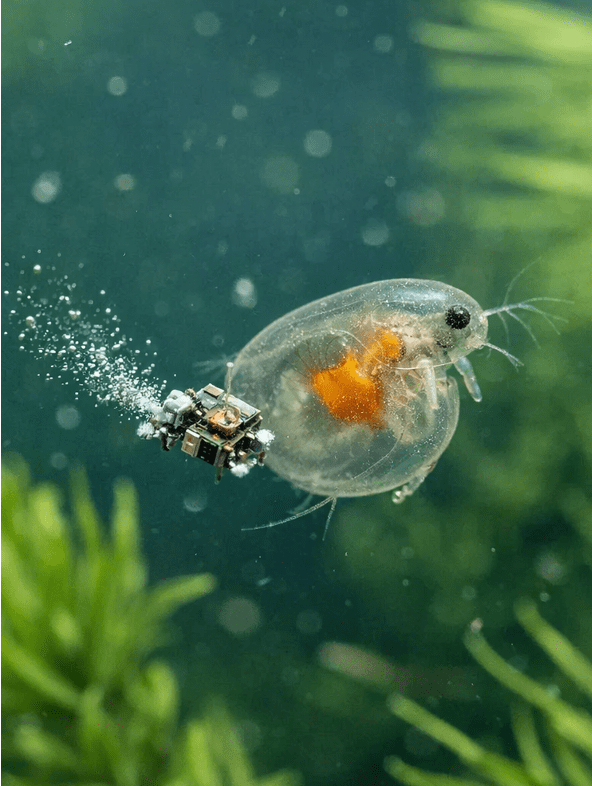
Fazit
Der kleinste programmierbare autonome Roboter der Welt zeigt, wie rasant sich Robotik und KI entwickeln. Obwohl er winzig ist, steckt in ihm jede Menge Technik und Zukunft. Vielleicht sind es genau solche Mini-Helfer, die eines Tages große Probleme lösen – leise, unsichtbar und unglaublich schlau.
FunFact
Wusstest du, dass… manche Mini-Roboter ihre Bewegung von Insekten wie Käfern oder Grillen abgeschaut haben? Die Natur ist oft die beste Ingenieur:in!
Für Profis 🔍
- Forschungsprojekte der Northwestern University zur Mikrorobotik: https://robotics.northwestern.edu/
- Wissenschaftliche Veröffentlichungen zu autonomen Mikrosystemen: https://www.science.org/doi/10.1126/scirobotics.adu8009
Quellenverweis
- Heise Online: „Forscher entwickeln kleinsten programmierbaren autonomen Roboter der Welt“ (2025): https://www.heise.de/news/Forscher-entwickeln-kleinsten-programmierbaren-autonomen-Roboter-der-Welt-11116123.html
Buchempfehlung
Wenn du noch mehr über Roboter und künstliche Intelligenz erfahren möchtest, schau dir das Buch „Roboter & KI” aus der SchlauFUX-Reihe des Kosmos Verlags an. Der Autor beschreibt darin viele weitere Roboter aus den unterschiedlichsten Anwendungsgebieten: Manche fliegen zum Mars, andere tauchen in den tiefsten Gewässern der Erde und wieder andere arbeiten in Fabriken ganz ohne Licht. 👉 https://www.kosmos.de/de/kosmos-schlaufux-roboter-und-ki_1182437_9783440182437
Alex vom Make Magazin stellt MakeyLab Roboter Experimentierset im Robots-Blog Interview vor
Kunst oder KI: Wer ist der Künstler?
Aktionswochenende und Ausstellung mit Lena Reifenhäuser und Sebastian Trella im Deutschen Museum Bonn

Was macht Kunst aus? Wie kann man KI im Bereich der Kunst für sich nutzen? Und wer ist dann der Urheber des Werks? Diese Frage steht im Mittelpunkt eines besonderen Wochenendes im Deutschen Museum Bonn mit Künstlerin Lena Reifenhäuser und Robotik-Spezialist Sebastian Trella.
Künstliche Intelligenz gewinnt in fast jedem Beruf immer mehr an Bedeutung. Insbesondere in kreativen Berufsfeldern zeichnet sich ab, dass es nur eine Frage der Zeit ist, dass die Nutzung von KI-Tools unumgänglich wird. Wo führt die Reise hin? Ist mit KI bald jeder Mensch ein Künstler? Und was bedeutet dies für unser Verständnis von Kunst?
Künstlerin Lena Reifenhäuser und Robotik-Enthusiast Sebastian Trella zeigen ein Wochenende lang in einem gemeinsamen Ausstellungsprojekt im Deutschen Museum Bonn, wie man KI-Anwendungen im Bereich der Kunst für sich nutzen kann und welche Möglichkeiten es dafür geben kann. Sie veranschaulichen, wie ausgehend vom Ursprungswerk eines Künstlers KI-generierte Kunst entsteht. Welche Schritte sind dafür nötig? Und wer ist am Ende eigentlich der Künstler, der Urheber des Werks, der die kreative Leistung erbracht hat? Handelt es sich um eine neue Art künstlerischer Zusammenarbeit?
»Eine Künstliche Intelligenz, also eine Maschine, arbeitet in Perfektion und wesentlich schneller als ein Mensch«, so Lena Reifenhäuser. »Aber sind es nicht genau unsere kleinen menschlichen ›Fehler‹ oder Abweichungen, die etwas überhaupt zu Kunst machen?«
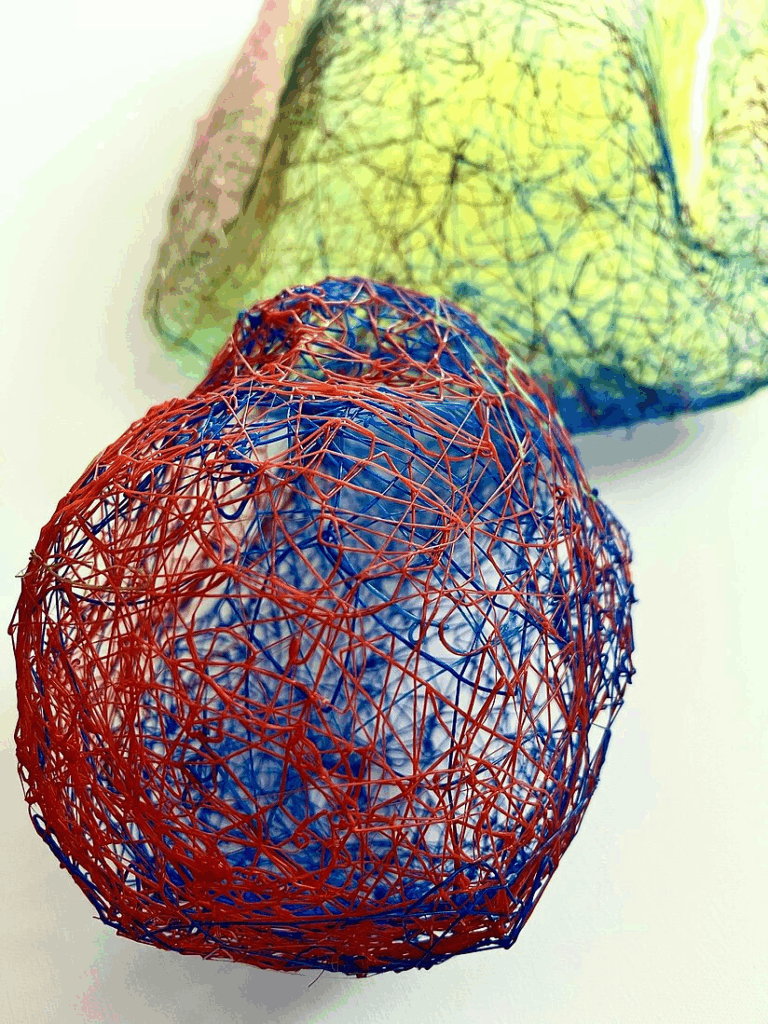
Die Ausstellung regt Fragen wie diese an, indem sie Werke der Künstlerin auf überraschende Weise präsentiert, multimedial neu interpretiert und dadurch gleichzeitig weiterentwickelt – sowohl mit als auch ohne KI. Sebastian Trellas Expertise im Bereich der Robotik und KI erweckt Zeichnungen und Malereien beispielsweise als Videoinstallationen zum Leben und eine KI erweitert bestehende Werke der Künstlerin völlig frei.
Im Zentrum dabei stets präsent: Die von Lena Reifenhäuser eigens für die Aktion mit einem 3D-Druckstift gefertigte Skulptur MANUEL(L) regt als manuell gefertigte Gegenüberstellung zur KI-Kunst zur Diskussion an.
Als Höhepunkt der Ausstellung wird ein völlig neues Werk, das von einer ausschließlich mit künstlerischen Arbeiten von Lena Reifenhäuser trainierten KI erstellt wurde, enthüllt und im Deutschen Museum Bonn an diesem Wochenende zum ersten Mal zu sehen sein.
An interaktiven Stationen können die Museumsgäste nicht zuletzt ihre eigene Kreativität ausleben: Eine 3D-Druckstift-Station bietet beispielsweise Groß und Klein die Möglichkeit, eigene Skulpturen zu erschaffen. Zudem kann ein Roboter in künstlerischer Aktion an beiden Tagen live erlebt werden.
Über die Künstler

Lena Reifenhäuser wurde 1986 in Troisdorf geboren und lebt in Bonn. 2018 hat sie den Studiengang Bildende Kunst mit der Fachrichtung Malerei an der Alanus Hochschule für Kunst und Gesellschaft in Alfter bei Bonn, abgeschlossen. Seitdem arbeitet sie als freischaffende Künstlerin. Zahlreiche Projekte und Ausstellungen im In- und Ausland, darunter Krakau, Georgien und China, runden ihre künstlerische Tätigkeit ab. Seit 2019 hat Lena Reifenhäuser ein Atelier im Kunsthaus Troisdorf.
Links: lenareifenhaeuser.de; www.instagram.com/lena_reifenhaeuser

Sebastian Trella wurde 1986 geboren und lebt in Troisdorf. Von 2007-2014 war er im Bereich Educational Robotics am Fraunhofer IAIS tätig und sammelt seitdem in seiner Freizeit Roboter und testet neue Robotik-Produkte für diverse Unternehmen. Er arbeitet hauptberuflich als Informatiker und betrachtet künstliche Intelligenz als einen faszinierenden Weg, Roboter zum Leben zu erwecken. Seit 2010 teilt er sein Wissen über Roboter und KI auf seiner Webseite Robots-Blog.com.
Lena Reifenhäuser und Sebastian Trella unterstützen das Deutsche Museum Bonn als Mitglieder von WISSENschaf(f)t SPASS – Förderverein für Bildung und Innovation im Rheinland e.V.
Robots-Blog trifft Daniel Kottlarz und humanoiden Roboter von MyBotShop auf Maker Faire Hannover
RoboCup 2027: Nürnberg als Zentrum der Robotik bei den RoboCup-Weltmeisterschaften in Deutschland
Die RoboCup Weltmeisterschaft 2027 findet im Juni in Deutschland statt: Mit Nürnberg wurde zum Abschluss des RoboCup 2025 in Brasilien offiziell der Austragungsort für den weltweit renommiertesten Wettbewerb für intelligente Robotik bekanntgegeben. Damit holt Deutschland die internationale Robotik-Elite erstmals seit 2016 wieder ins eigene Land – und setzt ein starkes Zeichen für seine technologische Zukunftsfähigkeit.
Der RoboCup gilt als globaler Leuchtturm für Forschung und Entwicklung in Robotik und Künstlicher Intelligenz (KI). Jährlich messen sich hier die besten Teams aus Universitäten, Hochschulen für Angewandte Wissenschaften und Schulen in realitätsnahen Szenarien – von Fußball über Haushaltsrobotik bis zu Rettungs- und Industrieanwendungen. Deutschland gehört seit Jahren zur Weltspitze und ist nun wieder Gastgeber dieses einzigartigen Innovationswettbewerbs.
Strategische Bedeutung für den Standort Deutschland
„Zentral für den Erfolg der Vergabe des RoboCup 2027 nach Nürnberg war die Unterstützung des Bundesministeriums für Forschung, Technologie und Raumfahrt, des Freistaats Bayern, der Stadt Nürnberg, des Robotics Institute Germany, der NEURA Robotics, der AFAG Messen und Ausstellungen GmbH, der Hans und Ria Messer Stiftung und nicht zuletzt des deutschen RoboCup-Komitees. Mit der Vergabe wird Deutschlands Rolle als international sichtbarer Impulsgeber für KI-basierte Robotik gestärkt“, erklärt Prof. Dr. Oskar von Stryk, Technische Universität Darmstadt, Co-Chair des RoboCup 2027. „Gerade vor dem Hintergrund des Fachkräftemangels und der demografischen Entwicklung brauchen wir innovative Technologien, die körperlich fordernde Arbeit intelligent unterstützen und zugleich dazu beitragen, Menschen in jeder Lebenslage ein selbstbestimmtes und unabhängiges Leben zu ermöglichen.“, ergänzt Dr. Maike Paetzel-Prüsmann, Johannes Gutenberg-Universität Mainz, Co-Chair des RoboCup 2027.
KI-basierte Robotik – sogenannte verkörperte Künstliche Intelligenz – ist entscheidend, um auch künftig Wohlstand, Wettbewerbsfähigkeit und Versorgungssicherheit zu garantieren. Der RoboCup beschleunigt die Entwicklung solcher Systeme, indem er Forschenden und Nachwuchstalenten eine reale Test- und Vergleichsplattform bietet – und Begeisterung für Technik und Innovation weckt.
Nachwuchsförderung und Gründergeist
Die RoboCup-Weltmeisterschaft ist mehr als ein Technologiewettbewerb – sie ist Talentschmiede, Bildungsplattform und Sprungbrett für Start-ups. In den Junior-Ligen sammeln Schülerinnen und Schüler erste Erfahrungen mit Informatik und Mechatronik, in den Major-Ligen entwickeln Studierende und Promovierende komplexe autonome Systeme auf höchstem Niveau. Viele starten danach erfolgreiche Karrieren in Unternehmen oder gründen eigene technologiegetriebene Start-ups.
„Der RoboCup verbindet Hightech mit Bildung, Wissenschaft mit Praxis, internationalen Austausch mit regionaler Innovationskraft“, so Prof. Dr. Stefan May, Technische Hochschule Nürnberg Georg Simon Ohm, Local Chair des RoboCup 2027. „Nürnberg bietet dafür das ideale Umfeld – zentral gelegen, technologisch und wirtschaftlich stark vernetzt und mit einer lebendigen Wissenschafts- und Gründerszene.“
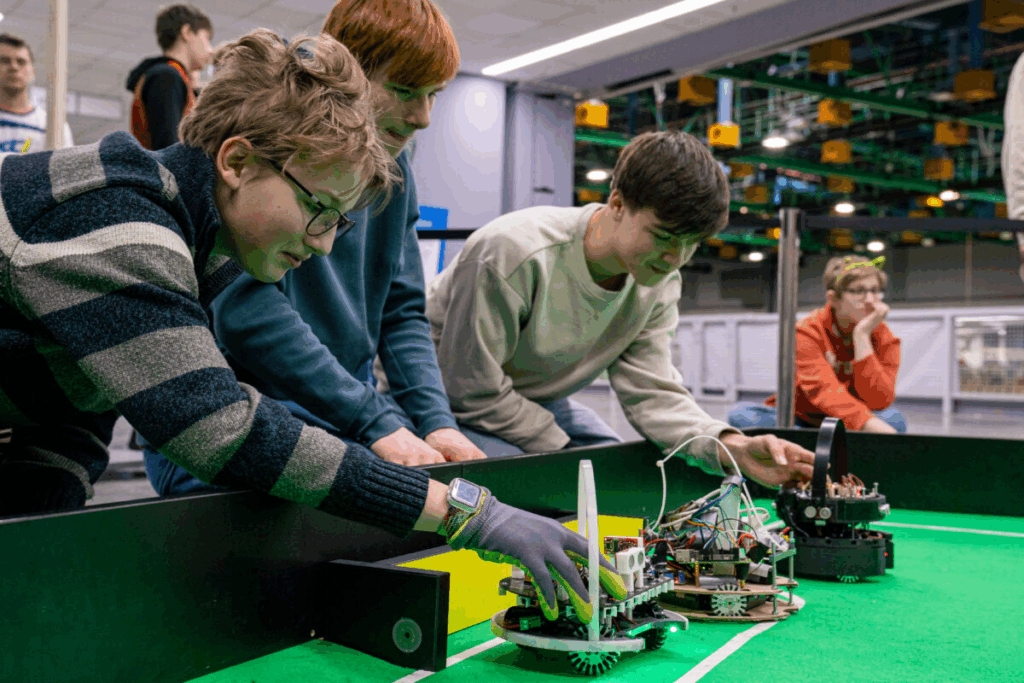
2027: Ein Meilenstein für Deutschland im Technologie-Wettlauf
Mit Blick auf den internationalen Wettlauf um technologische Souveränität setzt die RoboCup-Weltmeisterschaft 2027 ein wichtiges Signal. Deutschland braucht hochqualifizierte Köpfe und starke Innovationsökosysteme, um langfristig unabhängig und wettbewerbsfähig zu bleiben. Der RoboCup leistet dazu einen entscheidenden Beitrag.
Dorothee Bär, Bundesministerin für Forschung, Technologie und Raumfahrt: „In der Verbindung von KI und Robotik steckt ein riesiges Potential für Deutschland und Europa. Deshalb haben wir uns in der Bundesregierung die Förderung dieser Schlüsseltechnologien in der Hightech Agenda Deutschland zum Ziel gesetzt. Mit dem bereits vom Bundesforschungsministerium geförderten Robotics Institute Germany und dessen Verbindung zum RoboCup unterstützen wir gezielt Spitzenforschung und Talente für die KI-basierte Robotik. Bereits 2024 und 2025 haben wir die RoboCup German Open daher auch finanziell gefördert. Und wir haben auch die Bewerbung für die Weltmeisterschaft unterstützt. Ich freue mich sehr, dass wir den RoboCup 2027 in Deutschland willkommen heißen.“
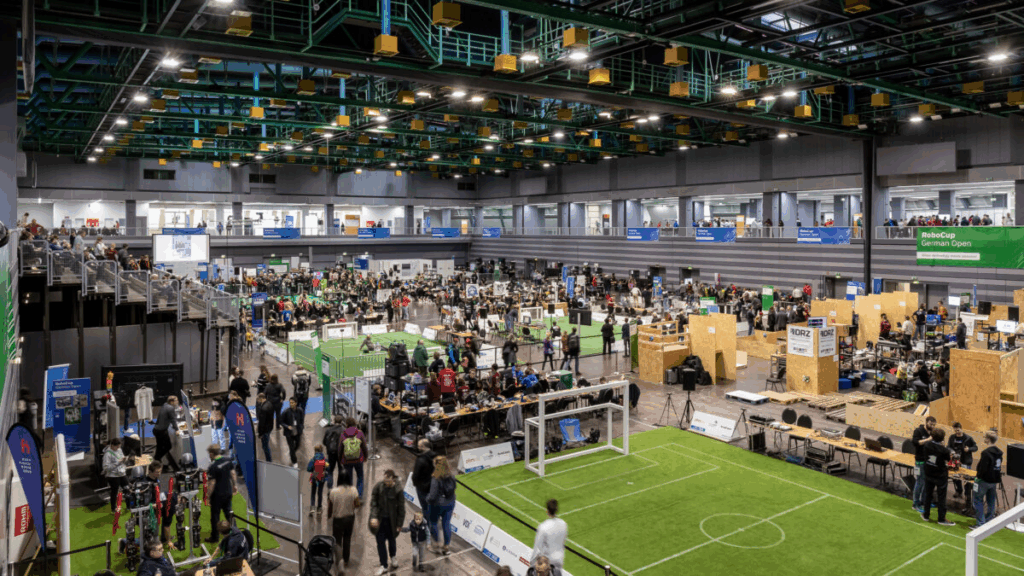
Dr. Markus Söder, Ministerpräsident des Freistaates Bayern: „Bayern ist bei Kl und Robotik einer der führenden Standorte Europas. Mit unserer Hightech Agenda investieren wir insgesamt sechs Milliarden Euro in Wissenschaft und Forschung. Damit soll etwa im ganzen Land ein einzigartiges Ökosystem für Künstliche Intelligenz wachsen. Das „Munich Center for Machine Learning“ und das „Munich Institute of Robotics and Machine Intelligence“ stehen für Künstliche Intelligenz von Weltrang – und in Nürnberg gründen wir mit der Technischen Universität UTN die erste rein auf Kl spezialisierte Universität in Deutschland. Die Staatsregierung freut sich auf die Austragung der RoboCup-Weltmeisterschaft 2027 in Nürnberg. Wir spielen in der Hightech-Champions-League – daher ist Bayern der perfekte Ort für den RoboCup!“.
Dr. Fabian Mehring, Bayerischer Staatsminister für Digitales: „Nürnberg ist unser bayerischer Leuchtturm für Robotik und Künstliche Intelligenz – mit der ersten eigenständigen KI-Universität Deutschlands und zahlreichen innovativen Forschungseinrichtungen. Die Stadt verfügt über eine starke Infrastruktur für internationale Veranstaltungen und engagiert sich aktiv für den wissenschaftlichen Nachwuchs. Ziel ist es, junge Talente zu begeistern und globale Netzwerke in Robotik und KI zu stärken. Ich freue mich darauf, die Teilnehmenden in Nürnberg willkommen zu heißen – für eine innovative Zukunft, die wir proaktiv und gemeinsam gestalten wollen.“
Prof. Dr. Tamim Asfour, Karlsruhe Institut für Technologie, Sprecher des Robotics Institute Germany (RIG): „Das RIG hat die Bewerbung Deutschlands für den RoboCup 2027 mit großem Nachdruck unterstützt. Als bundesweite Plattform führender Robotik- und KI-Institutionen – gefördert vom Bundesministerium für Forschung, Technologie und Raumfahrt – verbindet RIG Spitzenforschung, Talente und Wirtschaft, um bahnbrechende Innovationen voranzutreiben. Wettbewerbe wie der RoboCup sind starke Impulsgeber für Fortschritt und internationale Zusammenarbeit. Nach dem erfolgreichen Auftakt der German Robotics Conference gemeinsam mit den RoboCup German Open 2025 freuen wir uns darauf, die globale Robotik-Community in Deutschland für das größte Robotik- und KI-Event Europas in 2027 willkommen zu heißen.“
Prof. Dr. Angela Schoellig, TU München, Koordinatorin des Robotics Instituts Germany: „RoboCup und das Robotics Institute Germany teilen eine inspirierende Vision: Gemeinsam treiben wir bahnbrechende Innovationen in Robotik und Künstlicher Intelligenz voran – für eine nachhaltige Zukunft in Deutschland und weltweit. Mit der RoboCup-Weltmeisterschaft 2027 holen wir die klügsten jungen Köpfe aus aller Welt nach Deutschland. Wir sind begeistert, dieses einzigartige Event als Robotics Institute Germany mitzugestalten und zu unterstützen!“
David Reger, CEO und Gründer NEURA Robotics: „Wir entwickeln kognitive Roboter, die sehen, hören, fühlen und ganz natürlich mit Menschen und ihrer Umgebung interagieren. Beim Besuch der RoboCup German Open 2025 hat mich beeindruckt, wie Menschen verschiedener Generationen gemeinsam Roboter intelligente Aufgaben lösen lassen. Als größte Volkswirtschaft Europas ist Deutschland führend in den Bereichen Robotik und Automatisierung – mit einer starken Forschungsbasis. Damit ist hier der richtige Ort, um den RoboCup 2027 auszurichten.“
Über den RoboCup und das deutsche RoboCup-Komitee
Der 1997 gegründete RoboCup ist mit Teams aus mehr als 50 Nationen der weltweit älteste und größte Wettbewerb für intelligente Robotersysteme. Ziel ist es, technologische Entwicklungen in Robotik und KI durch reale Anwendungsszenarien voranzutreiben. Die Teilnehmenden entwickeln intelligente kollaborative robotische Systeme, die komplexe Aufgaben eigenständig bewältigen – unter Wettbewerbsbedingungen, die Innovation, Kreativität und Teamarbeit fordern.
Deutsche Wissenschaftlerinnen und Wissenschaftler haben die Entwicklung des RoboCups wesentlich mitgeprägt. Die deutschen Teams sind im RoboCup-Komitee Deutschland organisiert und haben die Bewerbung mit großem Engagement unterstützt und werden auch bei der Ausrichtung der Weltmeisterschaft eine tragende Rolle spielen. Sämtliche Mitglieder übernehmen zentrale Aufgaben in der Organisation und bringen ihre Expertise aktiv ein. Die Vorfreude ist spürbar – nicht nur das deutsche RoboCup-Komitee, sondern der gesamte RoboCup Deutschland blickt mit großer Erwartung darauf, die internationale RoboCup-Gemeinschaft 2027 wieder in Deutschland begrüßen zu dürfen.
Wir vom Robots-Blog freuen uns auf dieses Event und werden versuchen vor Ort dabei zu sein!
